Entertainment
Top 20 movies by Lenfilm studio
Published
2 years agoon

[ad_1]
In more than a century of existence, the studio has released more than 1,500 feature films, including such iconic pictures as ‘The Adventures of Sherlock Holmes & Dr. Watson’, ‘White Sun of the Desert’ and ‘Heart of a Dog’.
March 5, 2024, marks the 110th anniversary of ‘Lenfilm’, Russia’s oldest film studio. For a long time, April 30, 1918, was considered it’s birthday, when the Bolsheviks established the ‘Petrograd Film Committee’ (the first name of the studio).
However, the first Russian film studio emerged as early as 1914. The charitable Skobelev Committee under the General Staff established a cinematographic department in St. Petersburg, which had a monopoly on documentary footage from World War I. After the revolution and nationalization of private initiatives, it was on its basis that the ‘Petrograd Film Committee’, known today as ‘Lenfilm’ (this name appeared in 1934), was opened.
For more than a century of existence, the studio has produced such iconic movies as ‘The Adventures of Sherlock Holmes & Dr. Watson’, ‘White Sun of the Desert’ and ‘Heart of a Dog’.
1. ‘Storming the Winter Palace‘(dir. Konstantin Derzhavin, 1920)

Konstantin Derzhavin, 1920/Lenfilm
This movie was made for the anniversary of the 1917 October Revolution. And it featured a theatrical production of ‘The Storm of the Winter Palace’, staged by director Nikolai Evreinov. Soviet propaganda showed footage from this movie so often that they began to be perceived as documentaries.
2. ‘Chapaev‘ (dirs. Georgy & Sergey Vasilyev, 1934)
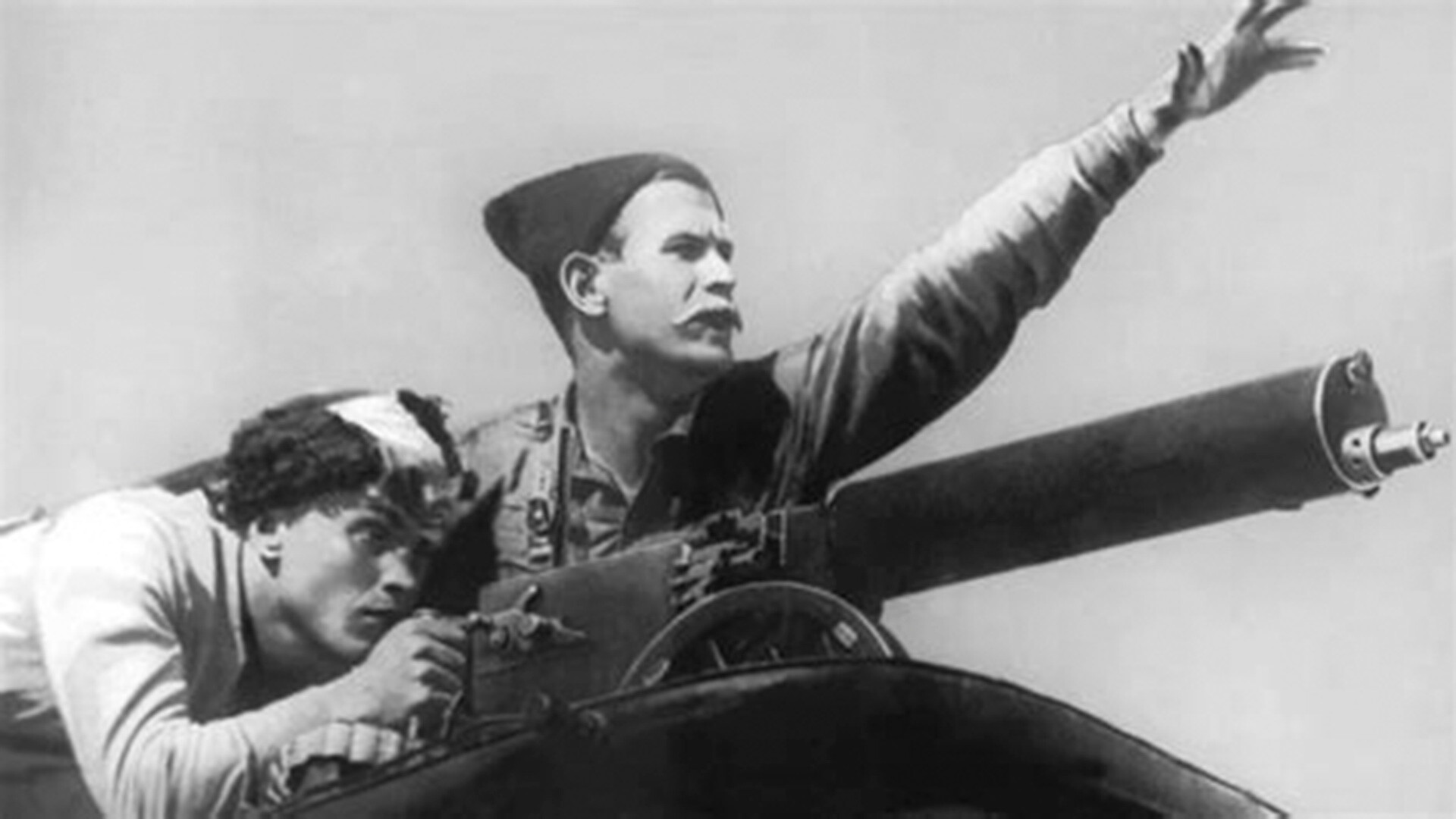
Georgy & Sergey Vasilyev, 1934/Lenfilm
This now cult movie about the Civil War won the first prize at the First Moscow Film Festival in 1935. The main characters are Red Army commander Vasily Chapaev, his warrant Petka and Anka the machine-gunner. All of them became folk heroes and hundreds of anecdotes were written about them. It was also one of Joseph Stalin’s favorite movies, which he watched, according to rumor, about 30 times.
3. ‘Cinderella‘ (dir. Nadezhda Kosheverova, Mikhail Shapiro, 1947)

Nadezhda Kosheverova, Mikhail Shapiro, 1947/Lenfilm
The screenplay for this fairy-tale movie was written by famous playwright Yevgeny Shvarts, who shone a new light on Charles Perrault’s good old story about a girl who loses one of her shoes. Soviet people related well to the storyline about a hard-working girl oppressed by her stepmother (played by legendary actress Faina Ranevskaya). And, at the time, the war-weary country needed a fairy tale-with a happy ending.
4. ‘Striped Trip‘ (dir. Vladimir Fetin, 1961)
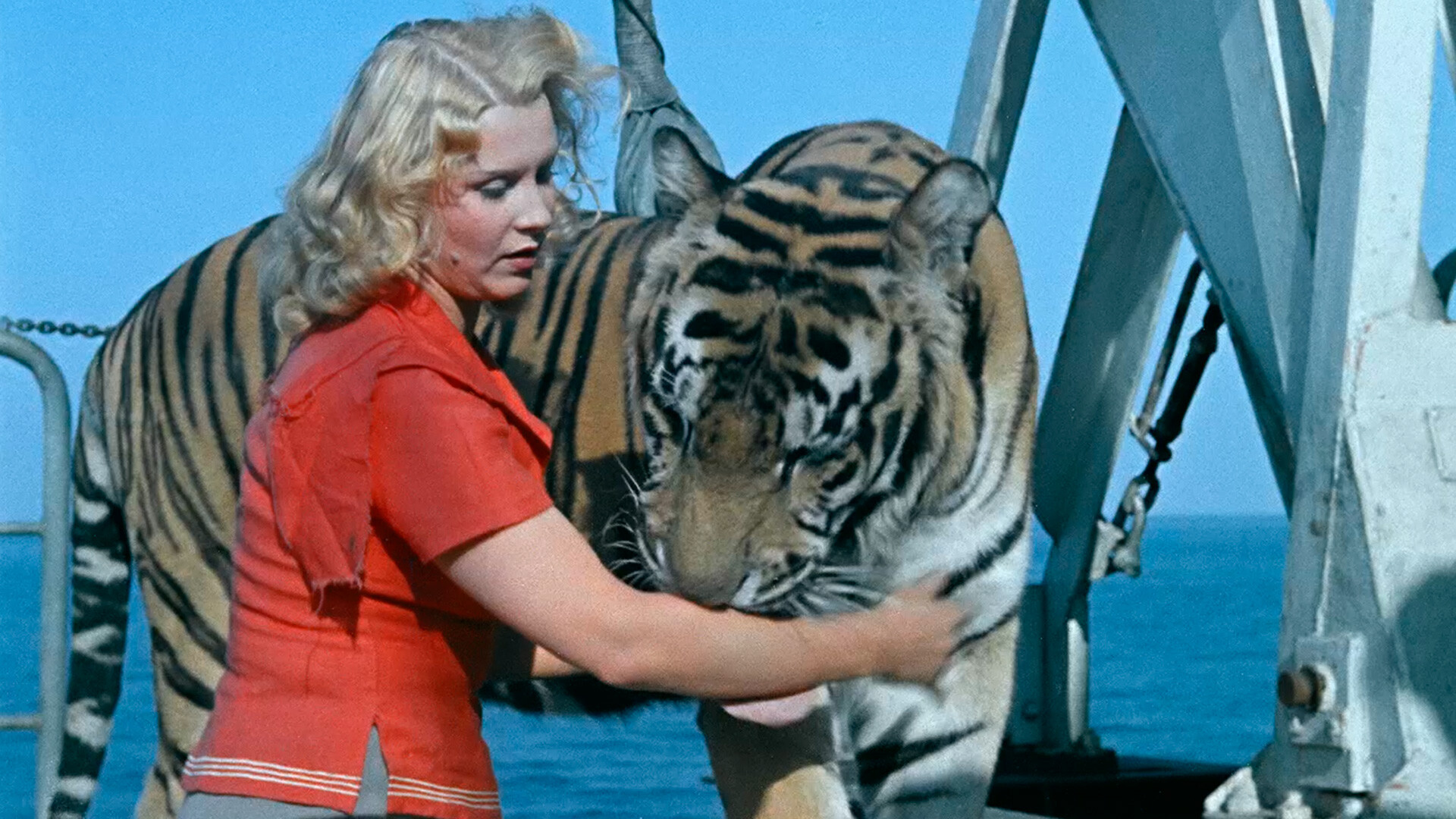
Vladimir Fetin, 1961/Lenfilm
This eccentric comedy became a box office hit in 1961, with 45.8 million viewers hitting the cinemas that year. According to the plot, a cook named Shuleykin takes a job aboard a Soviet ship leaving the port of a fictitious exotic country. A dozen tigers and lions are also on board, poached to be delivered to zoos in the USSR. To get home, the pretends to be a tamer of wild animals, who suddenly find themselves out of their cages once the journey is underway…
5. ‘Amphibian Man‘ (dir. Vladimir Chebotarev & Gennady Kazansky, 1961)
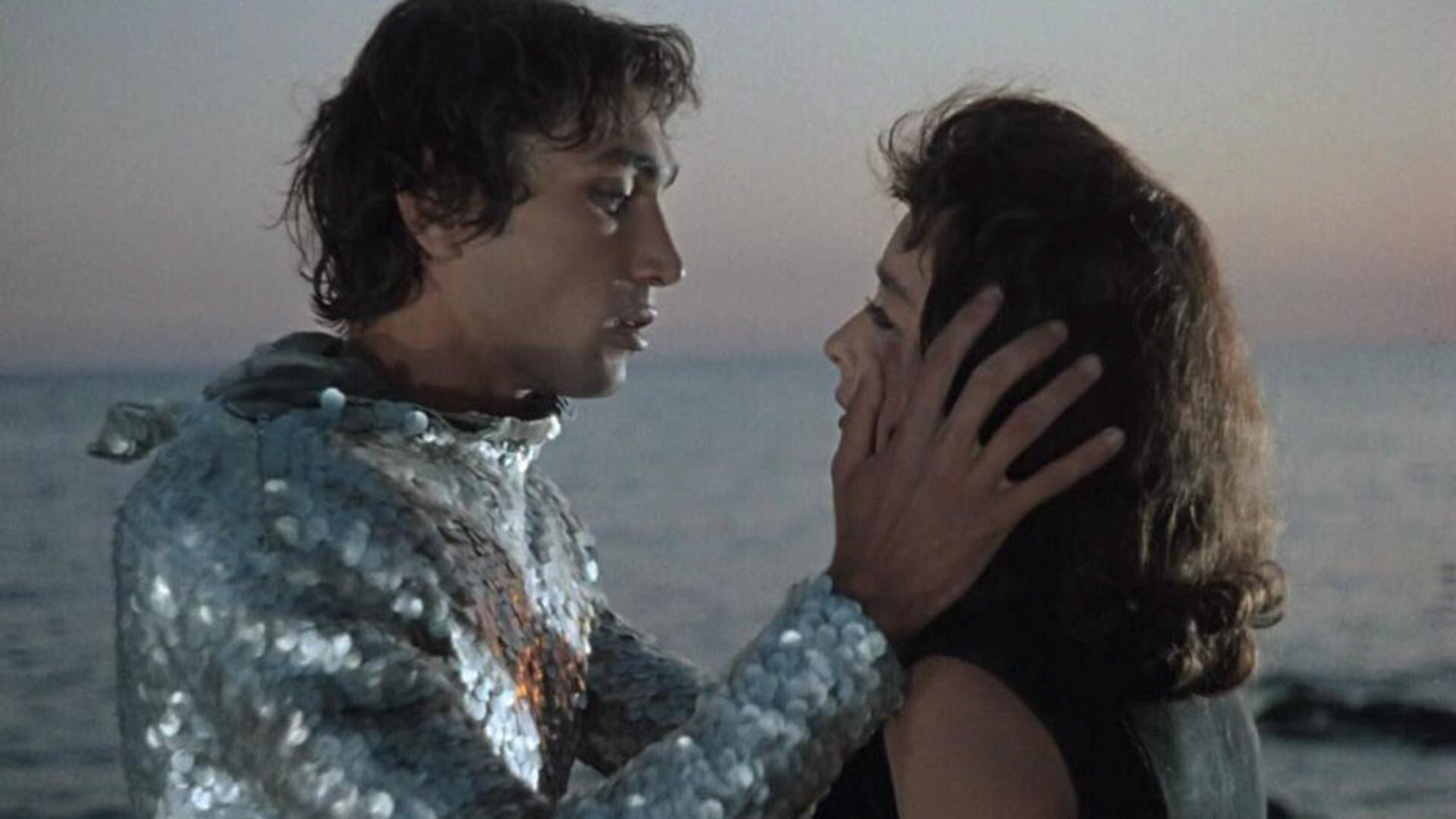
Vladimir Chebotarev & Gennady Kazansky, 1961/Lenfilm
The big screen adaptation of Alexander Belyaev‘s fantastic novel became a Soviet box office hit in 1962 (65 million viewers) and reminds of the Oscar-winning ‘The Shape of Water’ (2018). A young man (played by the charismatic Vladimir Korenev) has been transplanted with the gills of a shark. He lives in the water and makes friends with dolphins. But, one day, he falls in love with a girl he saves from drowning. He wants to become a human being to be with her. But alas, he can’t live without water for long…
6. ‘Hamlet‘ (dir. Grigory Kozintsev, 1964)
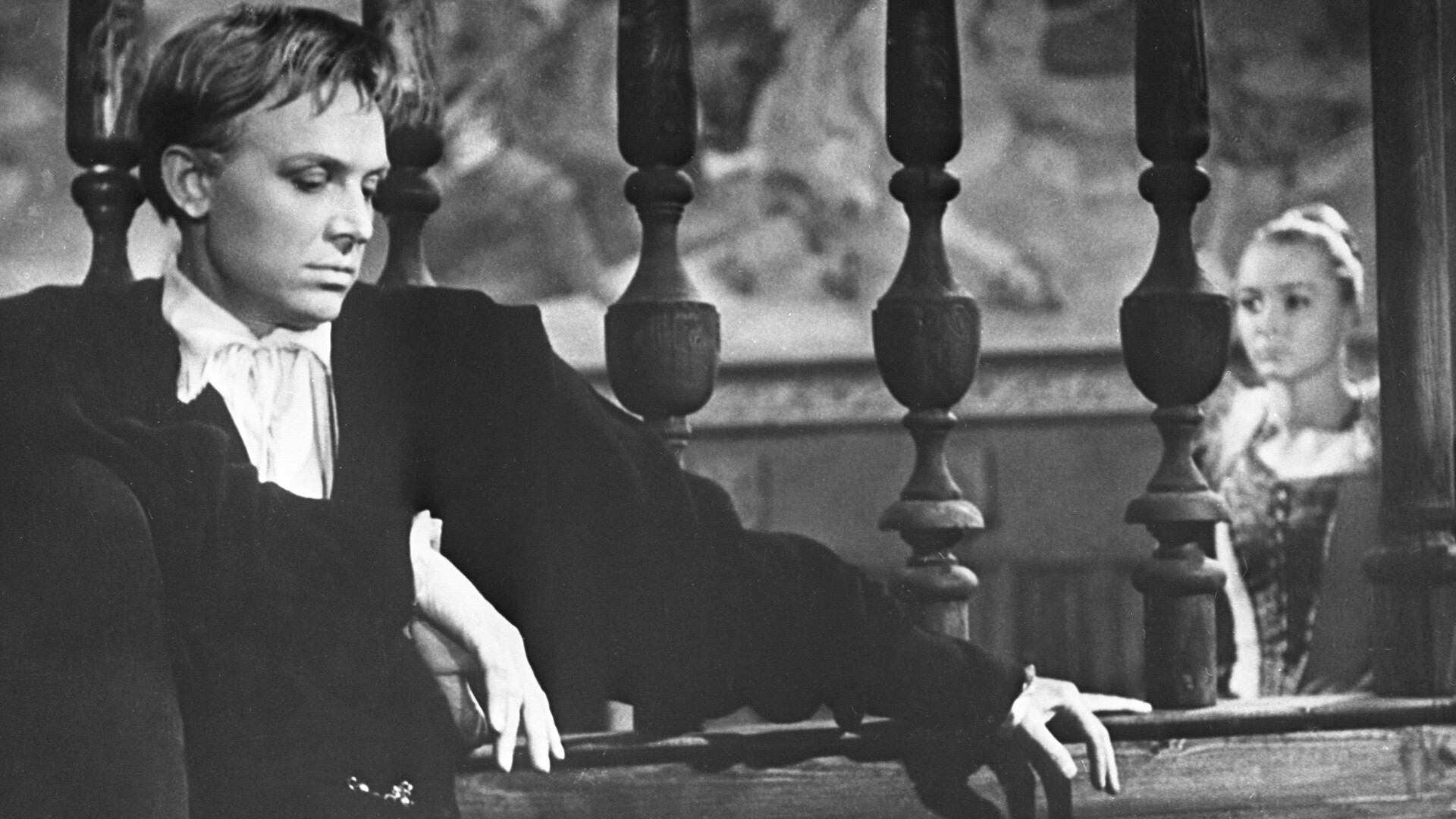
Grigory Kozintsev, 1964/Lenfilm
Shakespeare’s tragedy has always fascinated filmmakers all over the world and Russians are no exception. The role of Hamlet was played by Innokenty Smoktunovsky, considered one of the most outstanding Soviet actors, who was called the first intellectual character actor of Soviet cinema. His performance as the Prince of Denmark is still considered canonical today. The movie was nominated for many prestigious world film awards, but was only awarded the special prize at the Venice Film Festival.
7. ‘White Sun of the Desert‘ (dir. Vladimir Motyl, 1969)

Vladimir Motyl, 1969/Lenfilm
The south of Russia, the Caspian Sea. The Civil War has just ended. Red Army soldier Fyodor Sukhov is walking home through the desert to his beloved wife. Suddenly, he comes across some bandits…
This was considered the first Soviet ‘Eastern’ movie, which authorities initially refused to release in movie theaters, demanding it to be re-shot or have certain scenes cut out. But, it is believed that Soviet leader Leonid Brezhnev, a great fan of the genre of this movie, personally gave permission to release it.
8. ‘Trial on the Road‘ (dir. Alexei German, 1971)

Alexei German, 1971/Lenfilm
Alexei German was a representative of the Leningrad school of directors formed at ‘Lenfilm’ studio. They rejected the canonical socialist realism and strove for maximum authenticity. They often turned to the theme of World War II, rethinking its meaning and tragedy. German’s experiments went far: he filmed a movie about a former collaborator, who voluntarily surrendered to the partisans. But, censorship banned it from deing distributed. German was accused of distorting the heroic image of the Soviet people. Only in 1986 did ‘Trial on the Road’ finally reach a mass audience.
9. ‘Woodpeckers Don’t Get Headaches‘ (dir. Dinara Asanova, 1974)
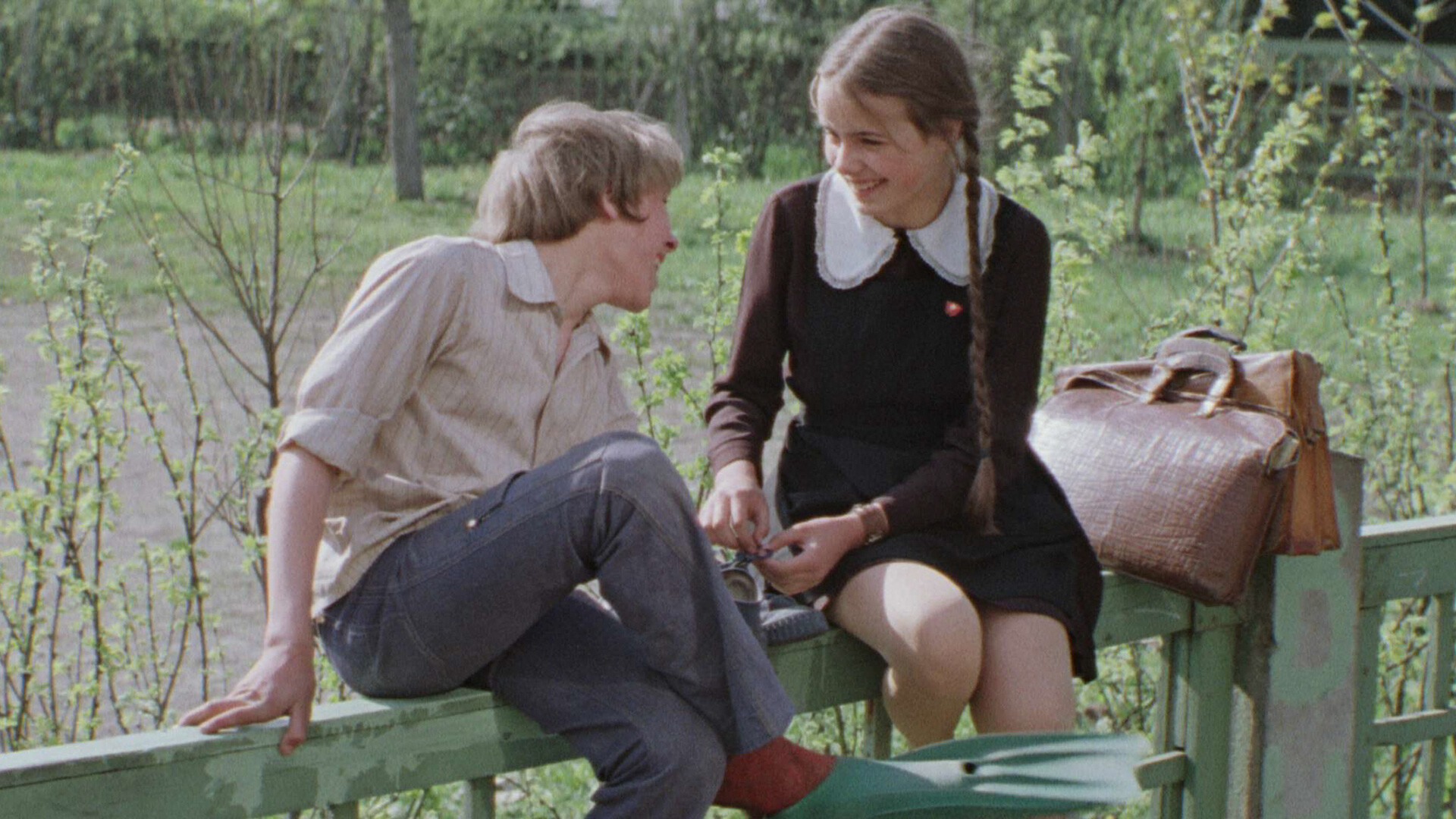
Dinara Asanova, 1974/Lenfilm
A Soviet schoolboy nicknamed ‘Fly’ dreams of playing drums in a jazz ensemble. But, so far, he is a weak and miserable teenager, that gets bullied a lot. Even his older brother, a basketball player, often gives him a hard time. Meanwhile, Fly is in love with his beautiful classmate Ira (who only sees him as a friend) and it seems to him that this teenage nightmare will never end. Director Asanova’s debut feature film is one of the first Soviet attempts to understand the “teenage” theme, the complex psychology of children growing up It is also a very atmospheric movie about first love.
10. ‘Twenty Days Without War‘ (dir. Alexei German, 1977)

Alexei German, 1977/Lenfilm
Another poignant movie by Alexei German on the World War II theme. A war correspondent goes on an editorial assignment to the rear to consult a movie filmed on his essays. And he falls in love and, for 20 days, forgets about everything, even about the war. The script for the movie was written by Konstantin Simonov, a real-life war correspondent, writer and poet (author of the iconic World War II poem ‘Wait for me and I’ll return’).
11. ‘The Lonely Voice of Man‘ (dir. Alexander Sokurov, 1978)

Alexander Sokurov, 1978/Lenfilm
Having returned home from the Civil War, a Red Army soldier cannot get away from its horrors and return to ordinary life. He falls in love with Lyuba, a student, and throws all his energy into taking care of her. This psychological drama (and Alexander Sokurov’s first full-length work) was also shelved for a long time and only saw distribution in 1987.
12. ‘The Adventures of Sherlock Holmes & Dr. Watson‘ (dir. Igor Maslennikov, 1979-1986)

Igor Maslennikov, 1985/Lenfilm
This Soviet TV show about the most famous literary detective turned out so successful that actor Vasily Livanov (who plays Sherlock Holmes) was even awarded the ‘Order of the British Empire’. London in the movie was “played” by Leningrad, Tallinn and Riga, while the apartment on Baker Street was created in one of ‘Lenfilm’ studio’s pavilions.
13. ‘Three in a Boat‘ (dir. Naum Birman, 1979)
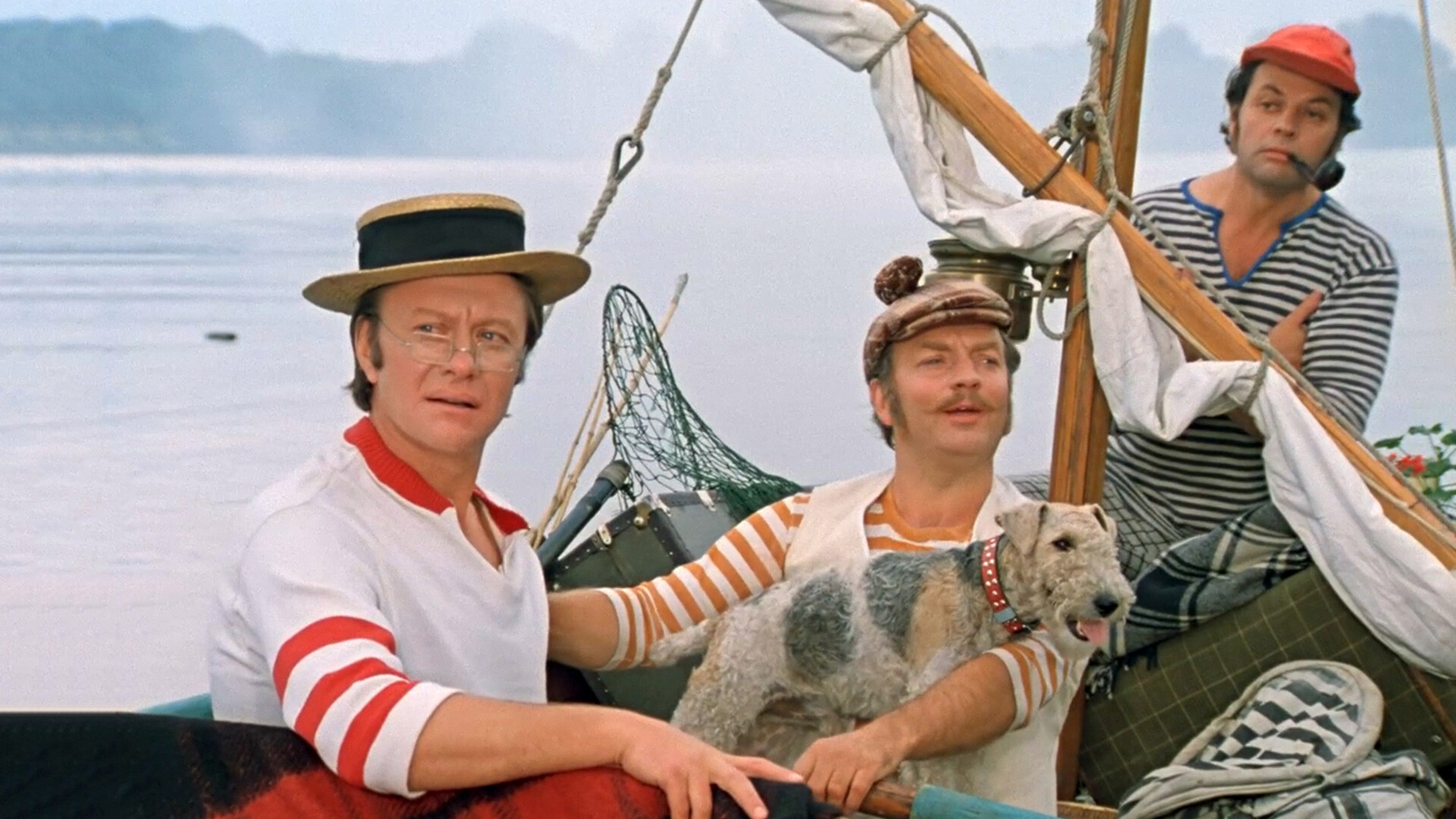
Naum Birman, 1979/Lenfilm
Soviet audiences got a somewhat caricatured image of Victorian gentlemen from this light musical comedy based on Jerome K. Jerome’s novel: A bit awkward, good-natured and romantic, wearing striped bathing suits and funny hats. One of the main roles was played by cult actor and sex symbol of that generation, Andrei Mironov.
14. ‘The Blonde Around the Corner‘ (dir. Vladimir Bortko, 1984)
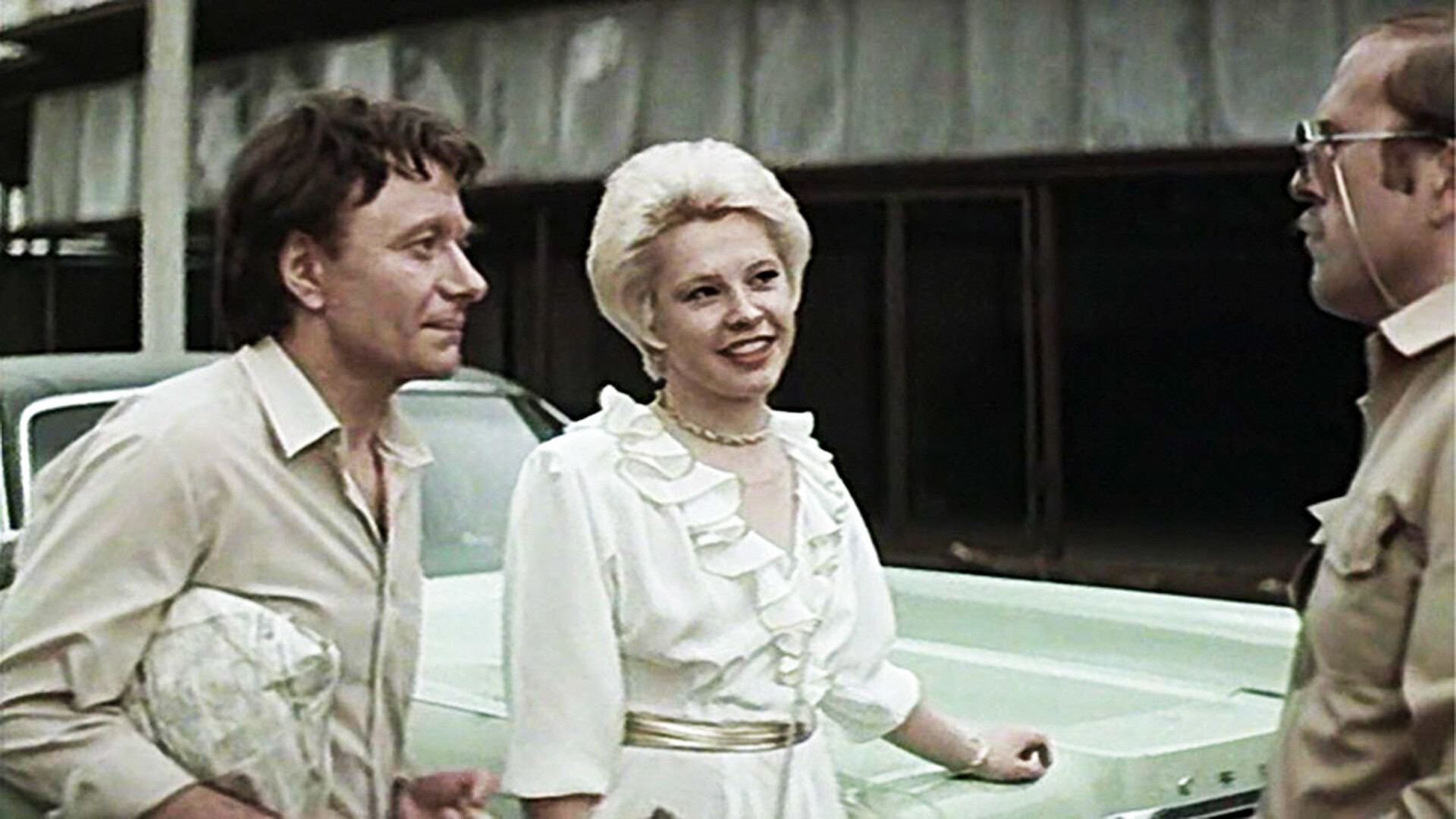
Vladimir Bortko, 1984/Lenfilm
Blonde Nadezhda is a real go-getter. She knows where to get things that are in short supply, is well connected and something of a VIP, since she works in a grocery store, which, in the USSR, was almost like being a factory boss.
Having fallen in love with a dreamy astrophysicist, she tries to remodel him, but he can think only of extraterrestrial civilizations. This is one of the last Soviet comedies and a box office hit in its day.
15. ‘My Friend Ivan Lapshin‘ (dir. Alexei German, 1984)
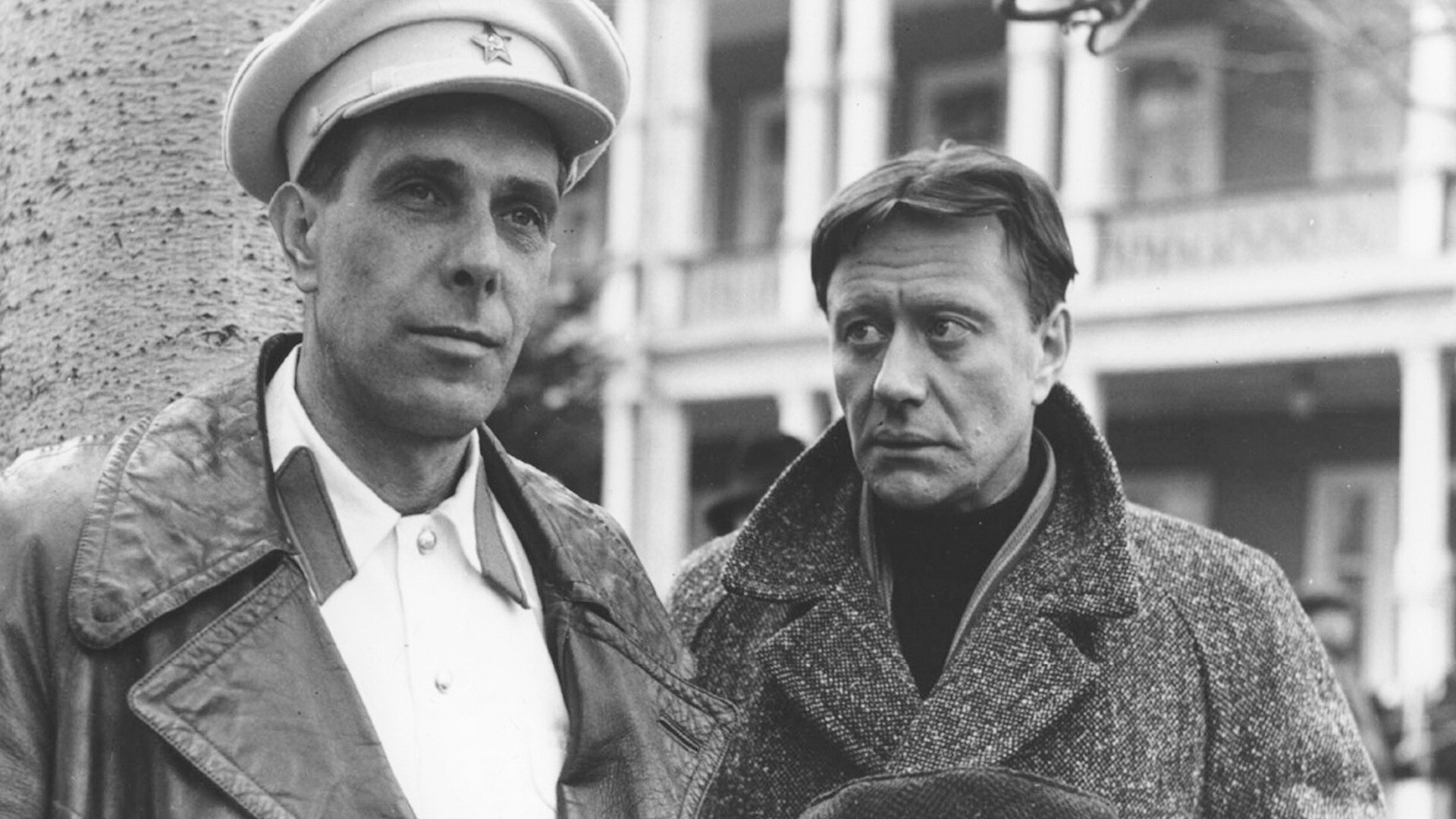
Alexei German, 1984/Lenfilm
One of the most important movies about perestroika was based on Alexei German’s father’s novel. In the movie, the director tried to convey the atmosphere of the 1930s and show a true hardscrabble portrait of the everyday life of that time.
In the plot, the chief of criminal police of a small town lives in a cramped communal apartment, catches a gang, unrequitedly falls in love with an actress and finds himself caught in a love triangle with an old friend.
16. ‘Winter Cherry‘ (dir. Igor Maslennikov, 1985)
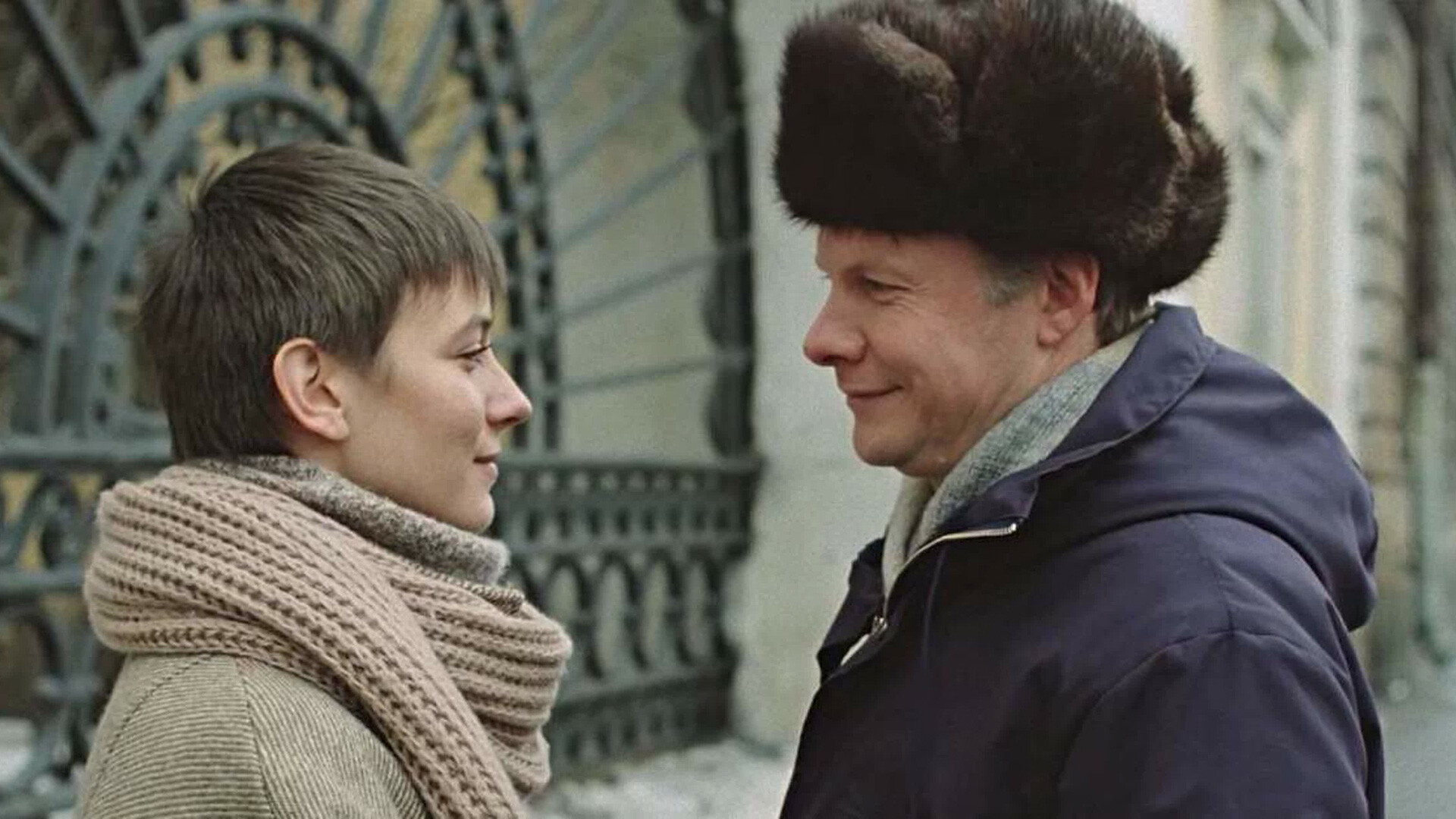
Igor Maslennikov, 1985/Lenfilm
This life-like melodrama about unspent love and loneliness was so beloved by Soviet audiences that director Igor Maslennikov, author of the abovementioned ‘Sherlock Holmes’ TV series, made two more sequels (and announced a fourth, but the project was frozen). It was one of the first Soviet perestroika movie to contain an erotic scene.
17. ‘Heart of a Dog‘ (dir. Vladimir Bortko, 1988)
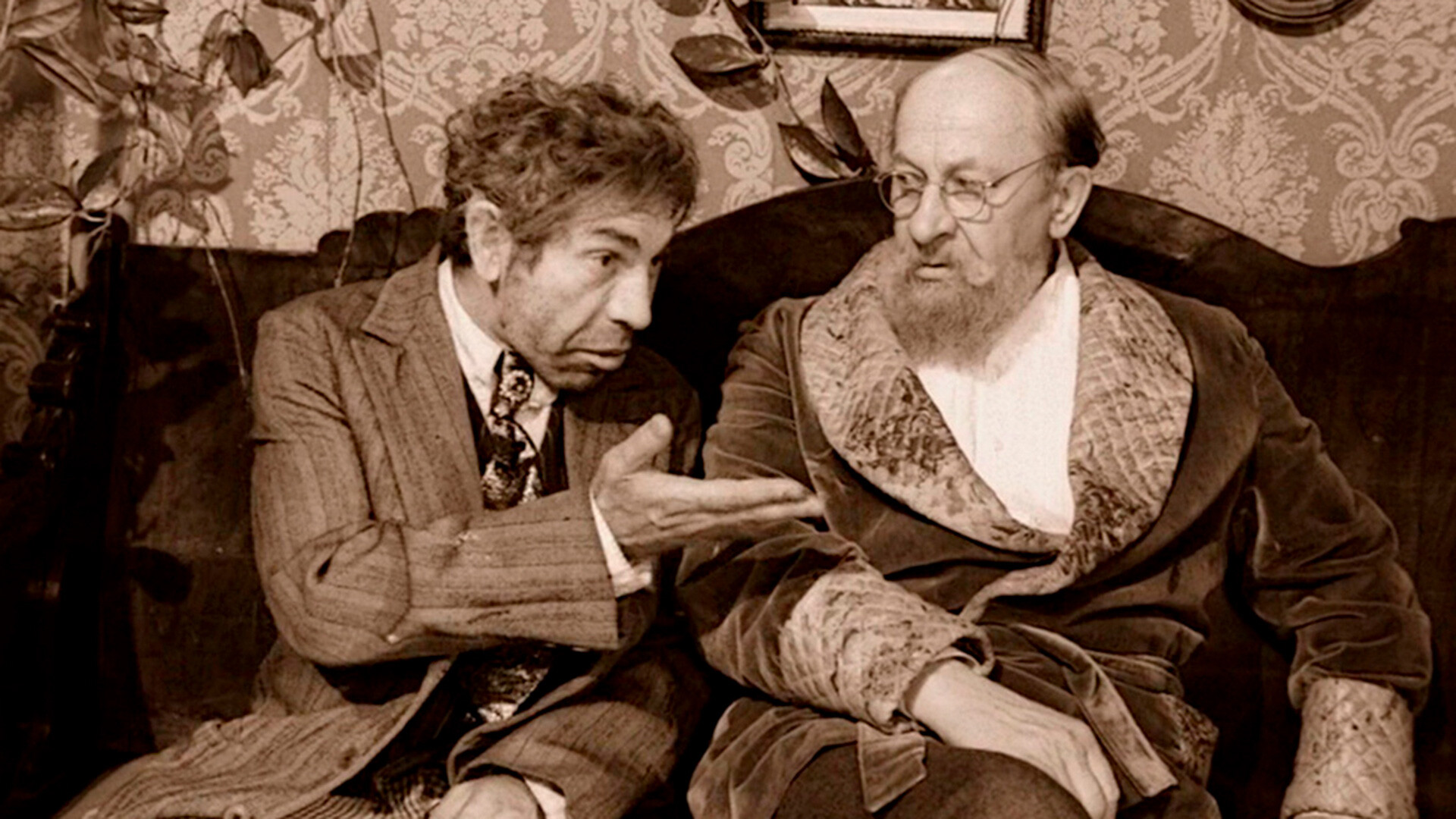
Vladimir Bortko, 1988/Lenfilm
Mikhail Bulgakov’s novel was banned for a long time in the USSR for being too satirical on the Soviet social order. But, during perestroika, it was finally published and it had such a deafening effect on the public that it was immediately adapted to the screen. Starring Yevgeny Yevstigneev, it became a cult movie and is an endless source of memes and quotes.
18. ‘Peculiarities of the National Hunt‘ (dir. Alexander Rogozhkin, 1995)

Alexander Rogozhkin, 1995/Lenfilm
A young Finnish man persuades a Russian friend to take him on a real Russian hunt. Not thinking long, the guy brings the foreigner to a company of hunters, among whom is his familiar general. To the Finn’s shock, the Russians start drinking heavily, steaming in the bath and, it seems, have even forgot about hunting…
This hilarious comedy propelled Finnish actor Ville Haapasalo to become a real star in Russia after the release. The movie became so popular that several sequels were made.
19. ‘Moloch‘ (dir. Alexander Sokurov, 1999)

Alexander Sokurov, 1999/Lenfilm
Outstanding director Alexander Sokurov is concerned with the question of the nature of power and has devoted five of his films to it. ‘Moloch’, the first in this series, shows a day in the private life of Adolf Hitler. The Führer is vacationing with Eva Braun in his cottage in the Alps, where he is visited by Joseph Goebbels with his wife Magda and Martin Bormann. Co-produced with France, Germany, Italy and Japan, the movie was filmed in Germany and won many international awards.
20. ‘Hard to Be a God‘ (dir. Alexey German, 2013)

Alexey German, 2013/Lenfilm
Alexei German thought about the screen adaptation of the Strugatsky brothers’ 1963 science fiction novel in the late 1960s, but only managed to realize his idea in the early 2000s. The movie became his last work. His son, director Alexei German Jr. had to complete the production and the premiere was held after his father’s death. The action takes place on another planet in the distant future, but the social order of humanoids more reminiscent of the earthly Middle Ages. A group of scientists from Earth observe the monks of an Order seize power.
Dear readers,
Our website and social media accounts are under threat of being restricted or banned, due to the current circumstances. So, to keep up with our latest content, simply do the following:
- Subscribe to our Telegram channel
- Subscribe to our weekly email newsletter
- Enable push notifications on our website
- Install a VPN service on your computer and/or phone to have access to our website, even if it is blocked in your country
[ad_2]
You may like
-


Indian expats in UAE, your UPI app just got a major upgrade, no need of separate phone for digital payments
-


Cristiano Ronaldo’s team drawn against FC Goa as Dubai’s Shabab Al Ahli face Saudi giants in AFC Champions League
-


India grants approval to Emirates NBD to establish wholly owned subsidiary in country
Entertainment
Dubai launches ‘Dubai+’ family streaming platform to boost digital media and creative economy
Published
1 month agoon
January 29, 2026
Sheikh Ahmed bin Mohammed bin Rashid Al Maktoum, Second Deputy Ruler of Dubai and Chairman of the Dubai Media Council, has approved the launch of Dubai+, a new family-oriented digital media platform, reinforcing Dubai’s ambition to become a global hub for digital media and the creative economy.
The approval came as Sheikh Ahmed chaired the Dubai Media Council’s first meeting of 2026 at Dubai Media, where members reviewed sector strategies and plans to strengthen content creation, innovation and local production capabilities.
What is Dubai+?
Dubai+ will offer a wide range of family-friendly content, bringing together:
- Local and Emirati productions
- Arab series and films
- International entertainment
The platform reflects Dubai Media’s integrated digital ecosystem strategy, responding to shifting viewer habits and the growing demand for high-quality, on-demand digital content.
“We believe media is a strategic force that shapes awareness, supports development and builds trust,” Sheikh Ahmed said.
Boosting Local Film and Content Production
The Council also reviewed plans to:
- Enhance local production capabilities
- Support cinema as a cultural and creative industry
- Invest in programmes that drive creative and economic growth
Samr Al Marzooqi, Director of Films and Production at the Dubai Media Council, outlined upcoming initiatives aimed at showcasing Emirati and international talent while strengthening Dubai’s film sector.
Next Phase of Growth
Mona Al Marri, Vice Chairperson and Managing Director of the Dubai Media Council, said the next phase will focus on monitoring implementation and ensuring measurable outcomes across the sector.
Secretary General Nehal Badri added that priorities include encouraging private sector participation, accelerating content development, and investing in talent, advanced production technologies and future-ready capabilities.
Announcements
DP World ILT20 Crowns ‘Habibi & Habibti’ as mascot winners
Published
4 months agoon
November 2, 2025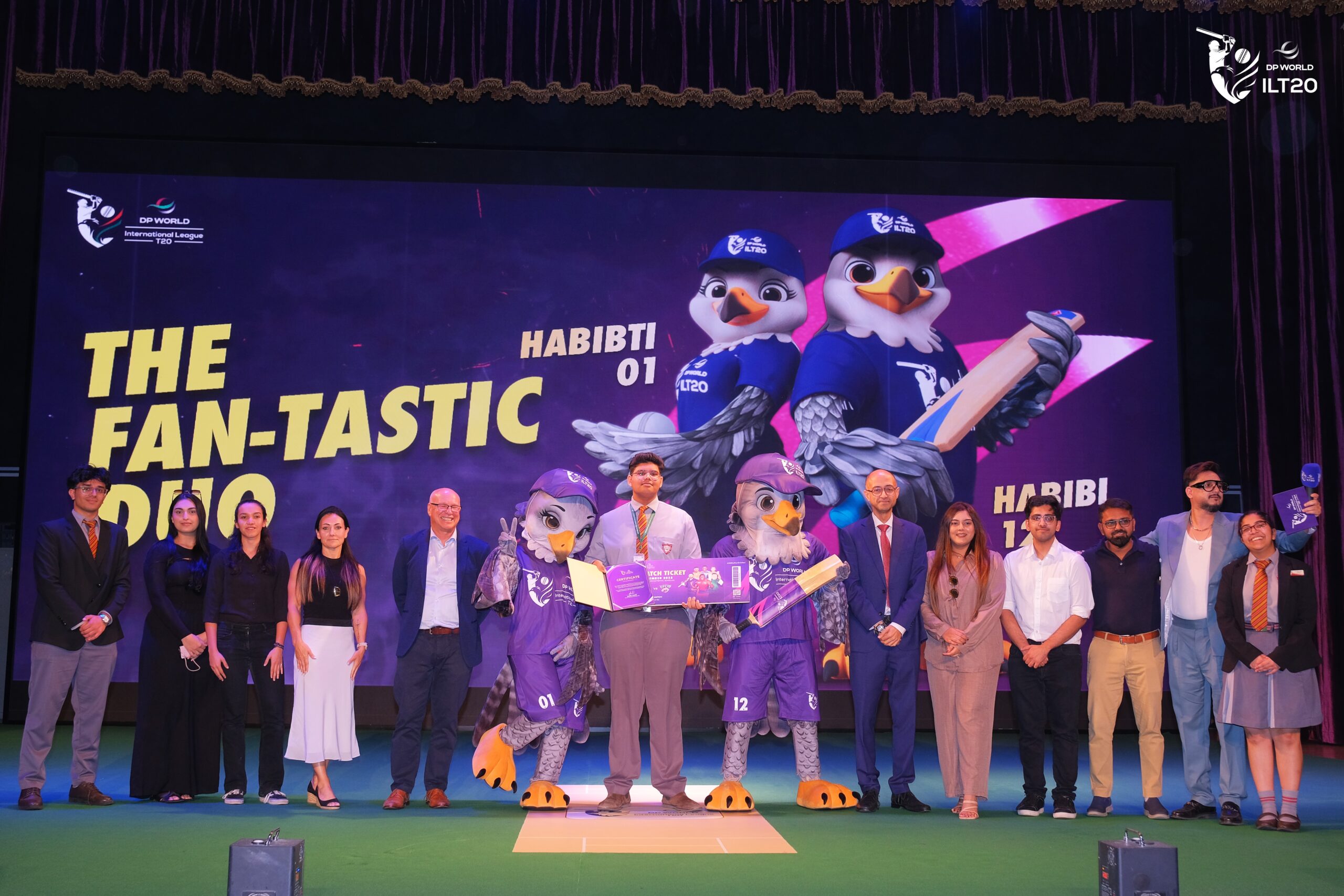
The DP World International League T20 concluded its first-of-its-kind Mascot Design Competition this week. The competition was held from 4 July to 21 September.
The competition captured the imagination of students across the UAE. With an overwhelming number of entries, the activation demonstrated the extraordinary creativity, enthusiasm, and energy that cricket inspires among young minds, making it a truly nationwide celebration of sport, culture, and community.
The grand mascot unveiling was held at the Sheikh Rashid Auditorium, Indian High School, Oud Metha. The winning student, Levin Veeroy Fernandes, was officially announced, and his imaginative design (Habibi and Habibti) was transformed into the official mascot of the DP World ILT20, now set to become the face of the league for seasons to come.
The event featured an exciting reveal ceremony, with the student’s design brought to life and presented in front of a vibrant audience, celebrating not only Levin’s creativity but also the remarkable participation of schools and students across the UAE.
The DP World ILT20 extends its heartfelt thanks to all participants whose contributions made this initiative a resounding success. Each entry brought unique ideas and perspectives, reinforcing the league’s commitment to inspiring young minds and celebrating the spirit of cricket.
DP World ILT20 CEO David White: “On behalf of team DP World International League T20, I want to thank all the participants for their efforts. For us, all of you are winners, we are delighted with the interest that the competition created across the UAE.
“The DP World ILT20 is all about UAE and the development of the sport amongst present and future generations of cricketers. Sport and cricket in particular has helped bring together a number of communities and nationalities across the UAE. Cricket has a four-decade long legacy in the country and with the continued growth of the league, the future of cricket not only in the UAE but across the Gulf region is bright and exciting.”
Indian High Schools Group CEO Shri Punit MK Vasu: “Our partnership with DP World ILT20 presents a remarkable platform for our learners to witness world-class cricket in Dubai while embracing the deeper lessons the sport imparts.
“At The Indian High Group of Schools, we uphold the belief that cricket’s enduring spirit fosters respect, discipline, leadership, resilience, teamwork, and composure under pressure, values that cultivate not only accomplished athletes, but also well-rounded, future-ready individuals prepared to lead with integrity, ethics and purpose in a global arena.”
The DP World International League T20 Season 4 will begin on Tuesday, 2 December – UAE National Day (Eid-Al-Etihad) with a blockbuster opening, the six-team, 34-match tournament will conclude with the final on Sunday, 4 January 2026.
Entertainment
Canada Super 60 set to dazzle with star-studded concert line-up at Vancouver’s BC Place
Published
5 months agoon
October 9, 2025
The Canada Super 60 isn’t just changing the game; it’s creating North America’s newest entertainment spectacle. From October 8 to 13, Vancouver’s iconic BC Place will transform into a full-fledged cultural carnival, blending high-octane cricket with back-to-back music concerts.
Get ready for six nights of non-stop entertainment, headlined by some of the biggest names in Punjabi, Desi, and global fusion music. From the infectious beats of Harrdy Sandhu and Jassie Gill to the international flair of Mickey Singh, each night promises a festival atmosphere both on and off the pitch.
Concert Line-Up Highlights
- Oct 8 – Harrdy Sandhu (9pm)
- Oct 9 – Jassie Gill (9pm)
- Oct 10 – Mickey Singh (9pm)
- Oct 11 – Parmish Verma (9pm)
- Oct 12 – Raf-Saperra (9pm)
- Oct 13 – GirlsLikeYou x Indo Warehouse (6:15pm)
The entertainment bonanza runs alongside thrilling cricket matches featuring international stars and fan favourites. With Yuvraj Singh backing the league and legends like Shikhar Dhawan and Suresh Raina on the field, Canada Super 60 is shaping up to be the ultimate blend of glamour, game, and groove.
“This is not just cricket; this is a lifestyle experience,” said a spokesperson for Canada Super 60. “Our entertainment line-up reflects the league’s ambition to unite cultures through music, sport, and community.”
Fans can expect full-scale stadium productions, food and cultural showcases, and plenty of Instagram-worthy moments, turning BC Place into Canada’s most happening venue this October.
About Canada Super 60
Canada Super 60 is the newest format in global cricket, a 60-ball showdown that delivers fast-paced action and festival-style entertainment. Backed by international icons and powered by music, sport, and cultural unity, it’s redefining how fans experience cricket in North America.

UAE announces early spring break for all educational institutions

US Embassy, Consulate in UAE closed: What it means for residents












